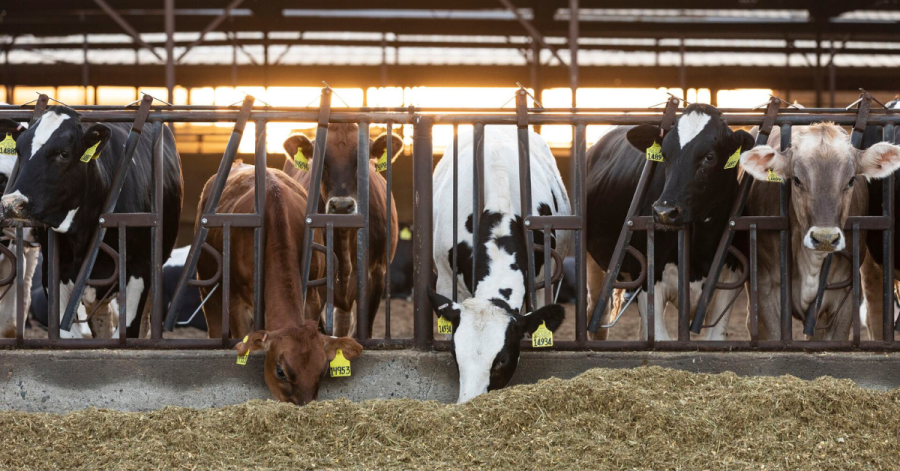Boost your dairy cows’ health and resilience with bacillus. Learn how to combat harmful pathogens and enhance beneficial microbes for optimal cow performance.

Boosting dairy cow health and resilience is within reach through the strategic use of bacillus products. These advanced interventions are designed to target detrimental microorganisms while fostering the proliferation of beneficial ones. Given a cow’s intricate microbiome, which hosts billions of bacteria, fungi, and other microorganisms, maintaining equilibrium is paramount for achieving peak health and performance. Bacillus products provide a precise method for managing this complex microbial ecosystem, enhancing the presence of microorganisms that decompose plant fibers and generate vital nutrients while suppressing harmful pathogens’ growth.
Understanding the Dairy Cow Microbiome
The microbiome of a dairy cow encompasses a vast array of bacteria, fungi, protozoa, and archaea, each playing a critical role in the cow’s digestive and overall health. The rumen and intestinal tract hold the pivotal microbiome populations, where fibrous plant materials are broken down to extract essential nutrients and energy.
However, not all microorganisms serve the cow’s well-being. While numerous microbes assist in nutrient digestion and bolster immune functions, pathogens such as E. coli and Clostridium perfringens can instigate severe health complications. Although beneficial bacteria enhance rumen efficiency and nutrient absorption, pathogens can derail this balance, leading to infections.
Maintaining this delicate equilibrium is paramount. Bacillus-based products play a crucial role by cultivating a healthier microbiome. Introduced through feed, these bacillus spores become active in the digestive tract, inhibiting harmful pathogens and augmenting the population of fiber-digesting bacteria, thus fostering improved health and digestion.
How Bacillus Controls Pathogens Like E. coli and Salmonella
Bacillus organisms are instrumental in fostering a balanced microbiome within dairy cows. Specific bacillus strains target harmful microorganisms such as E. coli and Salmonella by producing antimicrobial peptides, effectively curbing harmful bacteria while sparing beneficial species. This selective suppression impedes pathogens from colonizing the cow’s gastrointestinal tract, mitigating associated health risks.
Moreover, bacillus products bolster immune function by influencing tight junction proteins, thus enhancing the resilience of the gastrointestinal barrier. This strengthened barrier obstructs pathogens from breaching into the bloodstream, promoting a healthier microbial ecosystem within the rumen and intestines. For producers, incorporating bacillus-based probiotics into the diet spells improved overall health and performance for their dairy cattle herds.
Bacillus’s strategic intervention extends beyond E. coli and Salmonella to encompass Clostridium perfringens and other harmful species. Producers can effectively tackle the unique pathogenic threats inherent to their particular geographical regions by employing region-specific bacillus formulations, thereby enhancing overall herd health and productivity.
Transformations Within the Microbial Populations in the Rumen
Transformations within the microbial populations in the rumen, particularly the amplification of fiber-digesting bacteria, reveal a substantial impact on rumen efficiency. This enhancement enables more efficient degradation of plant material, resulting in improved nutrient absorption and overall energy utilization for the cow. Such progress in microbial management signifies a pivotal evolution in dairy production, charting a course for increased productivity and better health metrics among herds. Research led by luminaries such as Dr. Michael A. Ballou, combined with rigorous field applications, demonstrates that these microbial shifts enhance digestive efficiency and cultivate a more resilient and robust dairy cow capable of thriving under various stressors.
Boosting Immune Function with Bacillus
Extensive research into the functionality of Bacillus strains has underscored their indispensable role in bolstering immune function by modulating tight junction proteins. These proteins act as critical gatekeepers within the intestinal lining, blocking the incursion of pathogens into the bloodstream. Strains such as Bacillus subtilis and Bacillus licheniformis are particularly effective, enhancing the expression of these proteins and thus fortifying the intestinal barrier.
Enhanced tight junctions prevent leaky gut syndrome, often exacerbated by stressors like extreme temperatures or dietary transitions. For instance, dairy cows experience increased gut permeability during periods of excessive heat. Bacillus subtilis is invaluable, mitigating these adverse effects by reinforcing gut integrity and supporting immune function.
Each Bacillus strain offers unique functionalities—some produce antimicrobial peptides, while others improve gut structural integrity. This diversity underscores the importance of tailoring Bacillus formulations to address regional challenges and the specific needs of individual herds, thereby optimizing health and productivity.
Region-Specific Variations in Microbiome Due to Environmental Factors
The external environment profoundly influences the microbiome of dairy cows. Variables like temperature, humidity, and moisture levels engender regional disparities in pathogen types and loads. Different geographical locations sustain specific clostridium species, shaped by the local climate and feedstuffs. For instance, California’s propensity for corn silage, unlike New York’s haylage-dominant diets, directly impacts microbial ecosystems.
A case study underscores this phenomenon:
- Two adjacent farms.
- Merely apart and operated by the same family, reveal.
- Revealed discrepancies in pathogen loads. Despite
Implementing identical feeding programs, one farm experienced elevated pathogen levels due to its proximity to the coastline, positioning it within the flight route of seagulls that contaminated the feed. This case elucidates how seemingly minor environmental variations can significantly alter the microbiome, underscoring the necessity for customized bacillus formulations to address distinct regional challenges.
Custom Bacillus Formulations for Regional Challenges
Dairy health management necessitates region-specific bacillus formulations. Given the vast repertoire of nearly 30,000 bacillus strains, researchers meticulously select and combine strains to address each region’s specific challenges.
Custom formulations are imperative to tackle the diverse microbial challenges. They effectively inhibit pathogens, enhance rumen efficiency, and fortify cows’ immune systems. A precise approach ensures that the cows’ microbial requirements are met, ultimately boosting overall health and productivity.
Large dairies particularly benefit from these specialized formulations. By conducting detailed analyses of unique pathogen burdens and environmental stressors, specific bacillus strains are skillfully blended to address distinct issues. This strategy ensures that regional and individual dairy needs are met with precision and efficacy.
The Intricate Relationship Between Efficiency, Health, and Immune Function Reveals How Bacillus Formulations Enhance Overall Performance in Dairy Cows
The intricate relationship between efficiency, health, and immune function reveals how bacillus formulations enhance overall performance in dairy cows. By improving rumen efficiency through microbial population shifts, bacillus helps break down plant fibers more effectively, providing more energy and nutrients for the cow. This increased nutrient availability supports better health and higher milk production.
Bacillus strains fortify the immune system by enhancing tight junction proteins, reducing pathogen infiltration, and preventing leaky gut syndrome. A robust immune system means fewer disease outbreaks, lowering the incidence of health issues that can detract from productivity. This interplay suggests that cows with a fortified immune system are more resilient to stressors, whether they arise from environmental conditions or management practices.
Moreover, research suggests that these three factors—efficiency, health, and immune function—are deeply interrelated. Enhancing rumen efficiency directly improves nutrient absorption and supports a more robust immune response. A healthier immune system, in turn, decreases the burden of pathogens, further promoting efficiency and overall well-being.
Investigating the direct and indirect benefits of bacillus in dairy cows uncovers that improved efficiency leads to better health and immune responsiveness. Better health and a more robust immune system allow for higher performance levels, as cows are less inhibited by environmental and physiological stressors. Consequently, bacillus shows promise in creating a synergistic cycle of improved health, enhanced immune function, and heightened productivity.
The Practical Applications for Producers
The practical applications for producers with recurring stressors, such as heat waves, transition periods, and pathogen outbreaks, are considerable. Incorporating bacillus products can bolster dairy cow resilience, enabling them to navigate health and stress challenges more effectively. An enhanced immune system, improved pathogen control, and better gut health contribute to a more robust herd, minimizing health disruptions and maximizing efficiency in milk production.
Bacillus-based products offer myriad additional benefits. These include inhibiting pathogen growth within silage, driving fermentation processes, and enhancing microbial decomposition and nitrogen retention in manure management systems. Such interventions promote long-term farm sustainability, fostering a healthier environment while reducing dependence on antibiotics and other chemical treatments.
The future of bacillus-based innovations holds excellent promise. Developing products that inhibit pathogen growth in recycled manure for bedding represents a significant advancement. As researchers like Dr. Ben Saylor and institutions such as Oklahoma State University discover new strains and applications, the industry can anticipate increasingly targeted and practical solutions. Custom formulations, such as those produced by ARM & HAMMER, ensure that each blend meets unique regional requirements, highlighting a more personalized approach to animal health management.
As the industry progresses, the potential for bacillus products to revolutionize dairy farming becomes increasingly evident. From enhancing rumen efficiency to strengthening immune health and addressing environmental challenges, these microbial solutions promise a future in which dairy cows are healthier and more productive. Ongoing research by experts like Dr. Michael A. Ballou, with his expertise in nutritional immunology, will drive further innovations, solidifying bacillus as an indispensable component of modern dairy management.
The Bottom Line
Integrating bacillus-based probiotics into dairy cow diets represents a paradigm shift in enhancing health and productivity metrics within the dairy industry. Producers can achieve significant performance gains and more consistent production outcomes by capitalizing on the multifaceted benefits of bacillus—ranging from pathogen inhibition and improved fiber digestion to bolstered immune function. This innovation, supported by research and tailored specifically to regional challenges, underscores the indispensability of a strategic approach to microbiome management. Ultimately, the nominal cost of these probiotics is a small investment relative to the substantial enhancements in cow resilience and overall dairy profitability.
Key Takeaways:
- Inhibits harmful pathogens like E. coli and Salmonella
- Enhances fiber digestion and rumen efficiency
- Boosts immune function and prevents leaky gut syndrome
- Region-specific formulations address local challenges
The evidence is clear: Leveraging the power of bacillus formulations can transform your dairy operation. Take action today to enhance your herd’s resilience, combat health challenges, and improve overall performance.











